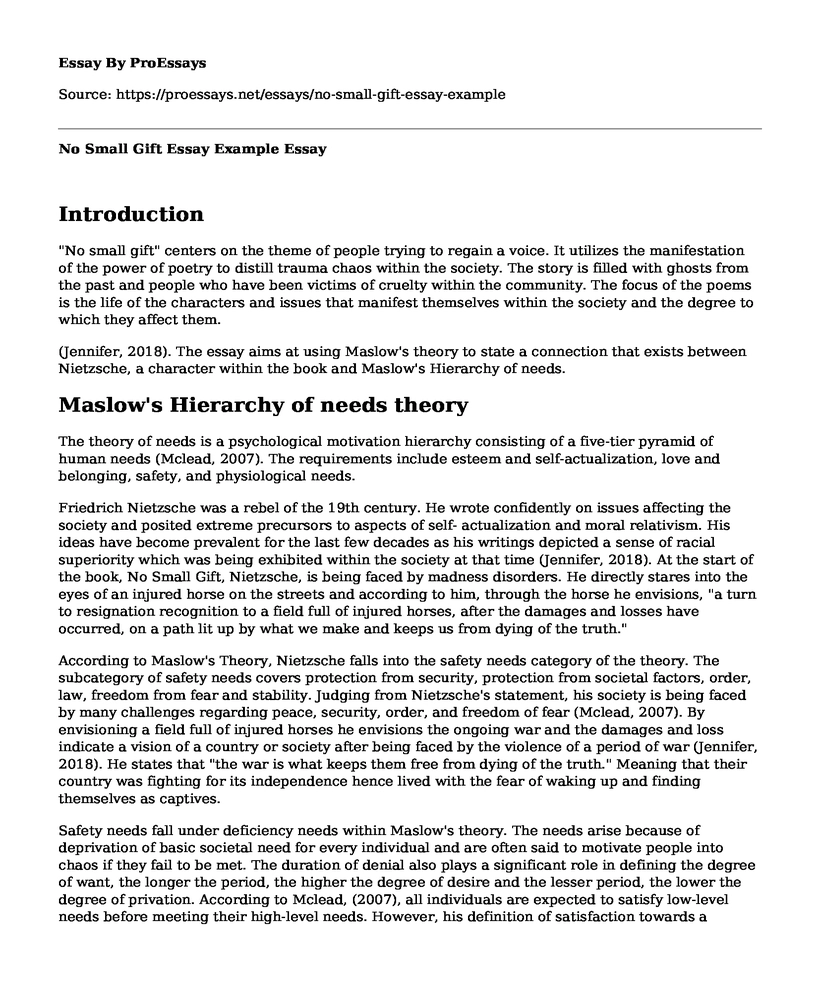Introduction
"No small gift" centers on the theme of people trying to regain a voice. It utilizes the manifestation of the power of poetry to distill trauma chaos within the society. The story is filled with ghosts from the past and people who have been victims of cruelty within the community. The focus of the poems is the life of the characters and issues that manifest themselves within the society and the degree to which they affect them.
(Jennifer, 2018). The essay aims at using Maslow's theory to state a connection that exists between Nietzsche, a character within the book and Maslow's Hierarchy of needs.
Maslow's Hierarchy of needs theory
The theory of needs is a psychological motivation hierarchy consisting of a five-tier pyramid of human needs (Mclead, 2007). The requirements include esteem and self-actualization, love and belonging, safety, and physiological needs.
Friedrich Nietzsche was a rebel of the 19th century. He wrote confidently on issues affecting the society and posited extreme precursors to aspects of self- actualization and moral relativism. His ideas have become prevalent for the last few decades as his writings depicted a sense of racial superiority which was being exhibited within the society at that time (Jennifer, 2018). At the start of the book, No Small Gift, Nietzsche, is being faced by madness disorders. He directly stares into the eyes of an injured horse on the streets and according to him, through the horse he envisions, "a turn to resignation recognition to a field full of injured horses, after the damages and losses have occurred, on a path lit up by what we make and keeps us from dying of the truth."
According to Maslow's Theory, Nietzsche falls into the safety needs category of the theory. The subcategory of safety needs covers protection from security, protection from societal factors, order, law, freedom from fear and stability. Judging from Nietzsche's statement, his society is being faced by many challenges regarding peace, security, order, and freedom of fear (Mclead, 2007). By envisioning a field full of injured horses he envisions the ongoing war and the damages and loss indicate a vision of a country or society after being faced by the violence of a period of war (Jennifer, 2018). He states that "the war is what keeps them free from dying of the truth." Meaning that their country was fighting for its independence hence lived with the fear of waking up and finding themselves as captives.
Safety needs fall under deficiency needs within Maslow's theory. The needs arise because of deprivation of basic societal need for every individual and are often said to motivate people into chaos if they fail to be met. The duration of denial also plays a significant role in defining the degree of want, the longer the period, the higher the degree of desire and the lesser period, the lower the degree of privation. According to Mclead, (2007), all individuals are expected to satisfy low-level needs before meeting their high-level needs. However, his definition of satisfaction towards a requirement is not based on an "all-to-none" phenomenon (Mclead, 2007). He explained that one need must not be fully satisfied for the next one to emerge.
The category fits perfectly with Nietzsche's current situation. According to the excerpt provided the psychological needs of the society have not yet been met, but the safety needs have already dominated behavior and taken precedence within the lives of the community (Mclead, 2007). The society is undergoing a period characterized by the absence of physical safety because of war that is taking place. Nietzsche's madness case is defined as a re-experience of post-traumatic stress disorder after a period of war that had occurred within the society. He states that by resisting to be captive, they are safeguarding the livelihoods of upcoming generations (Jennifer, 2018). According to the theory, safety needs are more likely to manifest themselves in children as they tend to exhibit a greater need to feel safe from harm. Lack of safety needs within the community motivates people to seek safety as they attempt to meet all levels of demands that they are exposed to for survival. Security and safety needs are subcategorized into financial security, personal security, wellbeing, and health.
Conclusion
Nietzsche is concerned with the current situation of the society and seems to envision how the past was and how the future is bound to be. His statement defines the people's fears whereas his madness is described as an effect caused by post wat trauma which manifests itself after a period of war and suffering. According to Maslow's theory, Nietzsche and his society are struggling to fulfill their safety needs within the organization hence categorized within the deficiency needs of the approach.
Works cited
Jennifer. Franklin. (2018). No small gift. University Press of New England.
McLeod, S. (2007). Maslow's hierarchy of needs. Simply Psychology, 1.
Cite this page
No Small Gift Essay Example. (2022, Aug 18). Retrieved from https://proessays.net/essays/no-small-gift-essay-example
If you are the original author of this essay and no longer wish to have it published on the ProEssays website, please click below to request its removal:
- The Fantasy of Being Young: Literary Analysis Essay on Oh To Be Young Again, I Think: A Poem
- Case Study on Autism
- Importance of Accountability Essay
- Comparison Between Plato's Allegory to The Truman Show
- Essay on School: A Key to Success for Every Child in the US
- Essay Example on Mental Approaches: Reasoning, Understanding & Expectations
- Essay Sample on Character Evolution of Daenerys Targaryen in the Series "Game of Thrones"







